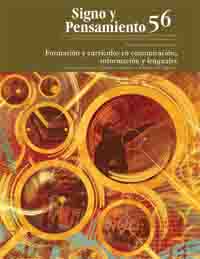Active citizenship: the syncretism of the rational subject with the relational man
##plugins.themes.bootstrap3.article.details##
The man of the 21st century originates many questions about the intimate relationship that is established between the crisis of social ties, the systems of representation and the emergence of communication as utopia. From the perspective of active citizenship, this text addresses the importance of the New Strategic Theory as a communicational paradigm, in relation to the rational subject and the relational man. At the same time, it tries to position its relevance and contemporaneity in the society of communication and globalization. In this context, the re-creation of a new public space and the recentralization of lost alterity appear as cornerstones of any field of knowledge in the area of the New Strategic Theory.
Active citizenship, Rational subject, Relational man, New Strategic Theory.Ciudadanía activa, Sujeto racional, Hombre relacional, Nueva teoría estratégica.Cidadania ativa, Sujeito racional, Homem relacional, Nova teoria estratégica.
Benjamin, W. (1961 - 1966), “Angelus Novus” en : Habermas, J. (1990) L’actualité de Walter Benjamin. La critique: prise de conscience et préservation. Revue d’Esthétique. Walter Benjamin. Hors de série. Paris, Jean-Michel Place.
— (1992), “Sobre a linguagem em geral e sobre a linguagem humana”, en : Sobre arte, técnica, linguagem e política. Lisboa, Relógio d’Água, pp. 177-196.
Breton, P. (1992), L’utopie de la communication: L’émergence de “l’homme sans intérieur”, Paris: La Découverte.
Cohen, J. e Arato, A. (1992), Civil society and political theory. Cambridge (Estados Unidos) – London, mit Press.
Dos Santos Alves, J. (6 de septembre de 2005), “Espaço Público e ‘Pós-modernidade’: A urgência da recentração da alteridade perdida” en: Fisec-estrategias (em línea), año I, núm. 2. Artículo disponible en: http://www.fisec-estra- tegias.com.ar/2 /fec_02_com_dossantos.pdf.
Duchesne, S. (1997), Citoyenneté à la française, Paris, Presses de Sciences.
Goffman, E. (1986), Frame Analysis: An Essay on the Organization of Experience, Boston, Northeastern University Press.
Goffman, E. et al. (1989), “Avant-propos. Le par- ler frais d’Erving Goffman avec deux textes d’Erving Goffman”, em : Colloque de Cerisy. Paris, Minuit,
Habermas, J. (1990), L’actualité de Walter Benjamin. La critique: prise de conscience et préser- vation. Revue d’Esthétique. Walter Benjamin. Hors de série. Paris, Jean-Michel Place.
— (1990a), “La nouvelle intimité entre politique et culture”, em : Ecrits politiques: Culture, droit et histoire, Bouchindhomme, C. (trad.), Paris, Cerf.
Israel, J. (1972), “Stipulations and construction in the social sciences”, em : Israel, J. y Tajfel, H (Edit.), (1972) The context of social psychology: A critical assessment. London, Academic Press, pp. 123-211.
Kant, I. (1984), “Resposta à Pergunta: O Que são as Luzes?” Pereira, J. (trad.) en : Cultura - História e Filosofia, vol. III, Lisboa, Universidade Nova de Lisboa, Centro de História.
Ladrière, J, (1997). L’éthique dans l’univers de la rationalité. Bruxelles – Paris – Montreal, Artel – Fides – diff – Sofedis.
— (2004), Le temps du possible. Louvain-la-Neuve: Éd. de l’Institut supérieur de philosophie, Louvain – Paris - Dudley (Etats Unîtes) Éd. Peeters.
— (2004), L’espérance de la raison. Louvain-la- Neuve: Éd. de l’Institut supérieur de philo- sophie; Louvain; Paris; Dudley (Mass.): Éd. Peeters.
Lapouge, G. (1991), Utopie et civilizations, Paris, Albin Michel.
Maffesoli, M. (2002), La part du Diable. Précis de subversion posmoderne. Paris, Flammarion.
Paperman, P. (1995), “La couleur des pensées. Sentiments, Émotions, Intentions. Raisons Pra- tiques” en : Ruwen Ogien. Núm. 6, pp. 7-18.
Pierson, M. (2003), L’Intelligence Relationnelle, Paris, Éd. d’Organisation.
Stringer, P. (1982), “Towards a participatory psychology”, em: Stringer, P. (Edit.). Confron- ting social issues. Vol. 2. London, Academic Press.
Uzzel, D. (sem ano disponível), Questioning methods in the interdisciplinary research and practice of environmental psychology (docu- mento digital em línea), disponivel em : http:// www.scielo.br/scielo.php?script=sci_arttext& pid=S010365642005000100020.
— (1998), Contemporary issues in heritage and environmental interpretation: problems and prospects, London, Stationery Office.
Van Steenbergen, B. (edit.), (1994), The Condition of Citizenship, London, Sage.
Vespraet, G. (2003), “Les nouveaux arguments de la citoyenneté active”. Retours de L’Utopie. Recompositions des espaces et mutations du politique, Laval, Presses de l’Université Laval.


